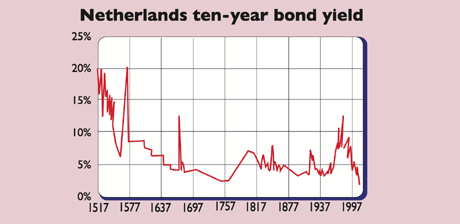Get the latest financial news, insights and expert analysis from our award-winning MoneyWeek team, to help you understand what really matters when it comes to your finances.
You are now subscribed
Your newsletter sign-up was successful
Want to add more newsletters?

Twice daily
MoneyWeek
Get the latest financial news, insights and expert analysis from our award-winning MoneyWeek team, to help you understand what really matters when it comes to your finances.

Four times a week
Look After My Bills
Sign up to our free money-saving newsletter, filled with the latest news and expert advice to help you find the best tips and deals for managing your bills. Start saving today!
Five years after the global financial crisis began it's remarkable "just how abnormal economies and financial markets remain", says Deutsche Bank. Deutsche's annual Long-term Asset Return Study is a stark reminder that "in many cases there are no historical precedents for what we are currently experiencing".
Ten-year bond yields in the Netherlands have hit their lowest level since 1517 (the Dutch data go back furthest). The most important global benchmark for ten-year yields, the US Treasury rate, recently hit a record low. Meanwhile, "base rates have never been so low, for so long, for so many".
The longest data series available on this front is the Bank of England's. At 0.5%, the base rate is the lowest since the Bank's inception in 1694 and below levels reached in wartime and during the Great Depression. On top of that, "the breadth of countries printing money is surely unique through economic history". As a result of quantitative easing, there are now assets worth 25% of GDP sitting on the Bank of England's balance sheet.
MoneyWeek
Subscribe to MoneyWeek today and get your first six magazine issues absolutely FREE

Sign up to Money Morning
Don't miss the latest investment and personal finances news, market analysis, plus money-saving tips with our free twice-daily newsletter
Don't miss the latest investment and personal finances news, market analysis, plus money-saving tips with our free twice-daily newsletter

So interest rates and central-bank balance sheets remain at emergency levels. And scant progress has been made in cleaning up the mess caused by the credit bubble and crisis. For all the talk about working off our debt, "we've basically seen minimal to no growth and no deleveraging" in the developed world in the past five years.
A rise in government debt has more than offset some private-sector deleveraging. As a result, overall debt (public and private) as a proportion of GDP has only declined in Australia and America since the end of 2007, and only barely. In the latter case, the debt load has eased from 348% of GDP to 345%, having peaked in 2009 at 366%.
With debt levels and money-printing activity at unparalleled highs and many financial indicators at multi-century highs or lows, "we really are embarking on a journey into the unknown", as the report puts it. Nobody knows if all this will end in an era of high inflation perhaps hyperinflation for some or deflationary defaults and debt restructurings, or just Japanese-style stagnation.
Given the uncertainty, investors should snap up high-quality real' assets on dips. So higher-dividend, quality equities remain Deutsche's "asset class of choice". Long-term investors should be eyeing up Europe, which looks "cheap to very cheap" relative to history and to America.
Get the latest financial news, insights and expert analysis from our award-winning MoneyWeek team, to help you understand what really matters when it comes to your finances.
MoneyWeek is written by a team of experienced and award-winning journalists, plus expert columnists. As well as daily digital news and features, MoneyWeek also publishes a weekly magazine, covering investing and personal finance. From share tips, pensions, gold to practical investment tips - we provide a round-up to help you make money and keep it.
-
 Should you buy an active ETF?
Should you buy an active ETF?ETFs are often mischaracterised as passive products, but they can be a convenient way to add active management to your portfolio
-
 Power up your pension before 5 April – easy ways to save before the tax year end
Power up your pension before 5 April – easy ways to save before the tax year endWith the end of the tax year looming, pension savers currently have a window to review and maximise what’s going into their retirement funds – we look at how

